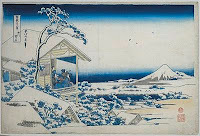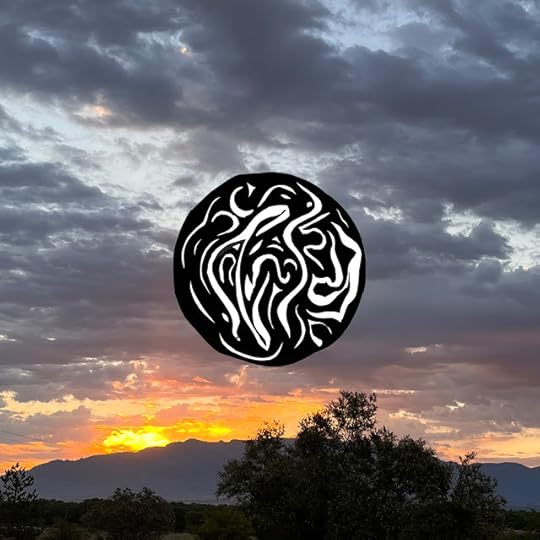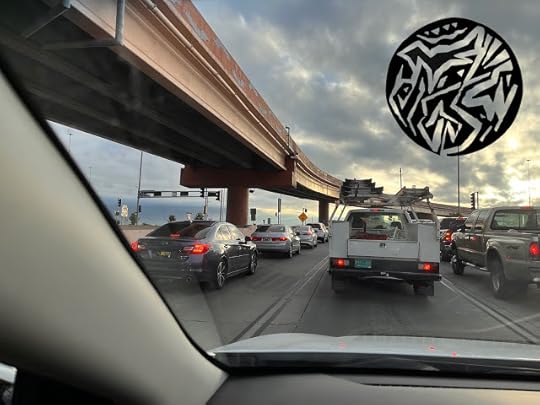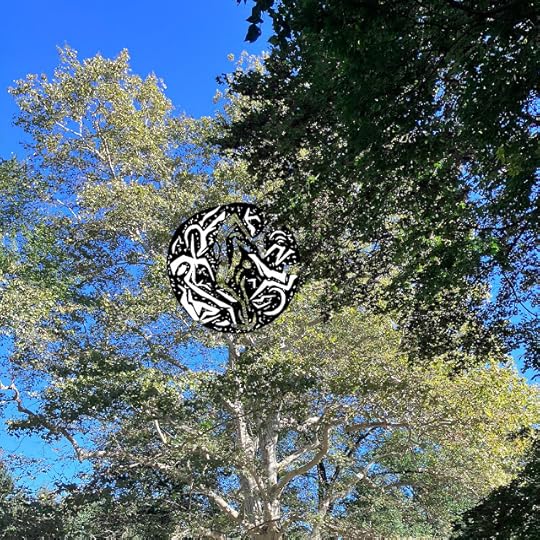Jonathan Price's Blog, page 2
August 27, 2024
Viewing Hokusai--Note on Method
Metaphor arises when fields collide.
One point pings in several planes at once—
A dust mite from one angle, from another, life.
This painting sits where the Buddhist path
Crosses the floating world, this beautiful illusion.
Uki is floating, yo’s the world, and this print, e,
One of the first consumer graphics, paid for
By merchants rising, daimyo’s switching
From castle to inn or factory, and rich peasants.
Ukiyo-e!
In Hokusai, Chinese mists blot out
Landscapes so detailed and almost real
That tourists have looked for the spots he sat,
Just to compare the picture to the present.
Loyal and proud, he painted the national icon
In perspective borrowed from the Dutch. Trade
Opened his eyes, and earned his rice. Popular,
he fitted humans into a large, wet land—
Dots in the distance, each distinct.
Flat, but deep, his art quotes
Other art, but looks convincingly strange,
Like a photograph: then, as we examine
A tower, or tree, we see the real dissolve.
The print’s an almost mechanical device
Switching us from one plane to another so fast
We become, stroboscopically, aware
Of all and everything, vibrating,
And we hear his voice, laughing like an angel,
Waking us from the nightmare of nationality and tribe,
Sheer soul sound, despite the Edo accent.
Other images in this series:In this project, we take off from each picture in Hokusai's 36 Views of Mount Fuji, plus the extras he added when customers asked for more. We look at each original, then offer a visual and textual exploration of questions such as:
What was Hokusai getting at? How was he working? How did this practice align with his spiritual growth?Please skim down this set of thumbnails to spot a picture you might want to explore, then click through. Or get the complete set in the book, Viewing Hokusai Viewing Mount Fuji.
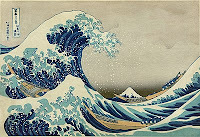
1 View through Waves off the Coast of Kanagawa
2 Morning after Snow in Koishikawa
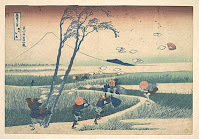
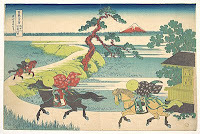
4 Sekiya Village on the Sumida River
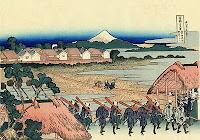
5 View from Senju in Musashi Province
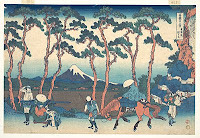
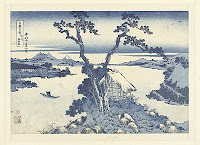 7 Lake Suwa in Shinano
7 Lake Suwa in Shinano
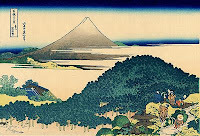 8 Cushion Pine at Aoyama
8 Cushion Pine at Aoyama
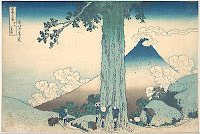 9 At Mishima Pass in Kai
9 At Mishima Pass in Kai
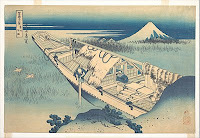 10 Ushibori in Hitachi
10 Ushibori in Hitachi
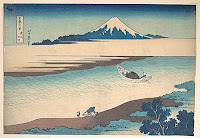 11 Tama River in Musashi
11 Tama River in Musashi
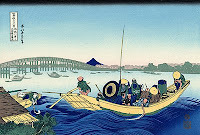 12 Sunset across the Ryōgoku Bridge from Sumida
12 Sunset across the Ryōgoku Bridge from Sumida
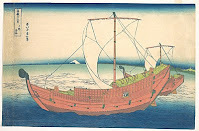 13 Sea Lane off Kazusa
13 Sea Lane off Kazusa
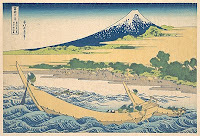 14 Off Tago Beach in Ejiri on the Tokaido
14 Off Tago Beach in Ejiri on the Tokaido
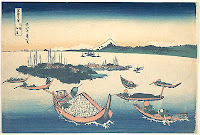 15 Tsukada-jima in Musashi Province
15 Tsukada-jima in Musashi Province
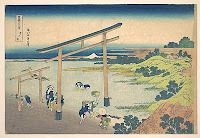 16 Bay of Noboto
16 Bay of Noboto
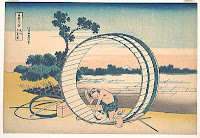 17 Fujimigahara in Owari
17 Fujimigahara in Owari
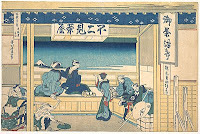 18 Yoshida on the Tōkaidō Highway
18 Yoshida on the Tōkaidō Highway
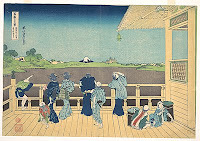 19 Sazai Hall, Temple of the 500 Arhats
19 Sazai Hall, Temple of the 500 Arhats
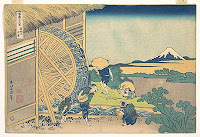 20 Watermill at Onden
20 Watermill at Onden
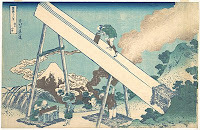 21 In the Mountains of Tōtōmi
21 In the Mountains of Tōtōmi
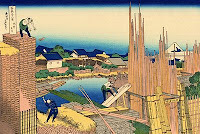 22 Tatekawa in Honjo
22 Tatekawa in Honjo
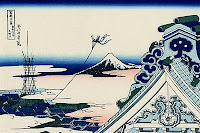 23 Hongan-ji Temple at Asakusa
23 Hongan-ji Temple at Asakusa
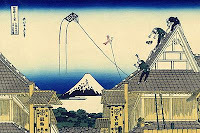 24 Mitsui Shop at Suruga-chō in Edo
24 Mitsui Shop at Suruga-chō in Edo
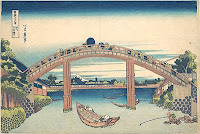 25 Under the Mannen Bridge in Fukagawa
25 Under the Mannen Bridge in Fukagawa
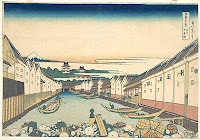 26 Nihonbashi
26 Nihonbashi
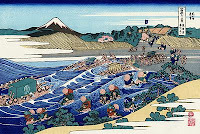 27 Crossing the Ōi River at Kanaya
27 Crossing the Ōi River at Kanaya
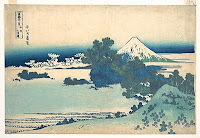 28 Shichiri Beach in Sagami
28 Shichiri Beach in Sagami
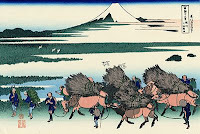 29 New Fields at Ōno Shinden
29 New Fields at Ōno Shinden
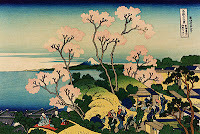 30 Hills at Gotenyama above Shinagawa
30 Hills at Gotenyama above Shinagawa
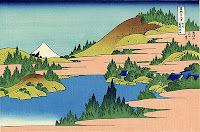 31 The Lake at Hakone in Sagami
31 The Lake at Hakone in Sagami
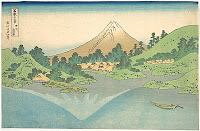 32 Misaka in Kai
32 Misaka in Kai
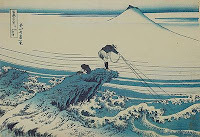 33 Kajikazawa in Kai Province
33 Kajikazawa in Kai Province
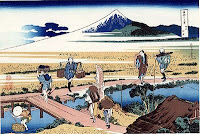 34 Nakahara in Sagami
34 Nakahara in Sagami
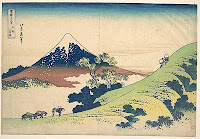 35 The Inume Pass in Kai Province
35 The Inume Pass in Kai Province
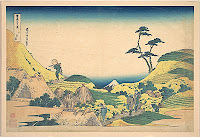 36 Shimo Meguro
36 Shimo Meguro
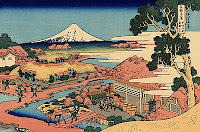
37 Tea Fields at Katakura in Suruga
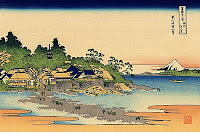 38 Sōshū Enoshima in Sagami
38 Sōshū Enoshima in Sagami
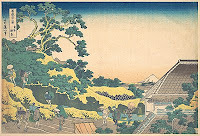 39 Surugadai in Edo
39 Surugadai in Edo
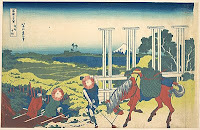 40 Senju in Musashi Province
40 Senju in Musashi Province
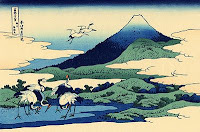 41 The Fields of Umezawa in Sagami
41 The Fields of Umezawa in Sagami
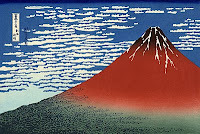 42 A Fine, Breezy Day
42 A Fine, Breezy Day
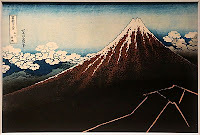 43 Storm Below the Summit
43 Storm Below the Summit
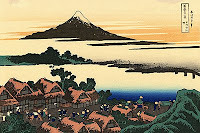 44 Dawn at Isawa in Kai Province
44 Dawn at Isawa in Kai Province
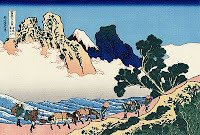 45 The Other Side of Mt. Fuji, from Minobu River
45 The Other Side of Mt. Fuji, from Minobu River
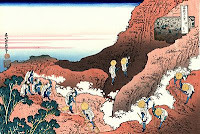 46 Climbing Mt. Fuji
46 Climbing Mt. FujiAbout the BookViewing Hokusai Viewing Mount FujiISBN-10: 0-9719954-7-8 ISBN-13: 978-0-9719954-7-576 pages, full colorThis series and the accompanying book serve as a meditation on Hokusai, taking apart the prints in the series, 36 Views of Mount Fuji, zooming in digitally, assembling a 21st century interpretation of his practice, as he celebrates the natural landscape of a nation coming up with a new idea of itself.
Each image starts with one of Hokusai’s views, disassembles it, constructs a new picture out of the pieces, as a visual critique, and adds floating text chunks—brief observations, snippets of poetry, stray thoughts.
Thumbnails of the originals let you compare the before-and-after, gauging Hokusai’s wood-block print against the pixelated, sliced, and diced collage, and the scattered writings that reflect on his drive for immortality, his exploitation of newly available pigments, his fondness for the interplay of text and image, and his love for the ordinary workers and travelers out in the country.
An Afterword discusses the path that the artist and poet, Jonathan Reeve Price, took to this homage to Hokusai. He sees parallels between Hokusai’s art practice and the functions available in software such as Photoshop, tactics that he has adapted to our century—zooming, revising, layering, making depth hard to read, indulging in bright blocks of color. Hokusai created more than a thousand images combining poetry and imagery, and Price points to those artworks as justification for his own mixing of language, line, and color in his responses.
In 19th century Japan, the number 36 might have reminded literate customers of the number of the immortals—the classical poets of Japan and China. But when Hokusai’s series of 36 prints sold well, he added another 10 pictures. So this book offers a total of 46 digital images, followed by a critical essay, and an FAQ about the author’s background. Holding this book in your hand may not make you live forever, but, who knows, it might bring you some of Hokusai’s spirit.
Viewing Hokusai Viewing Mount Fuji
About Me
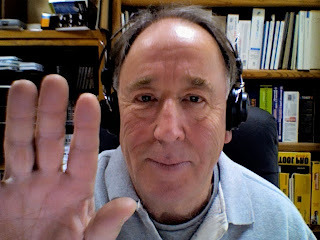 I'm Jonathan Reeve Price, an information architect, writer, and artist.
I'm Jonathan Reeve Price, an information architect, writer, and artist. Linked In: http://www.linkedin.com/in/JonathanReevePrice
Amazon Author Page: https://www.amazon.com/author/jonathanprice
Twitter: http://twitter.com/JonathanRPrice
Museum Zero: museumzero.art
August 26, 2024
Visitation at the Orsay
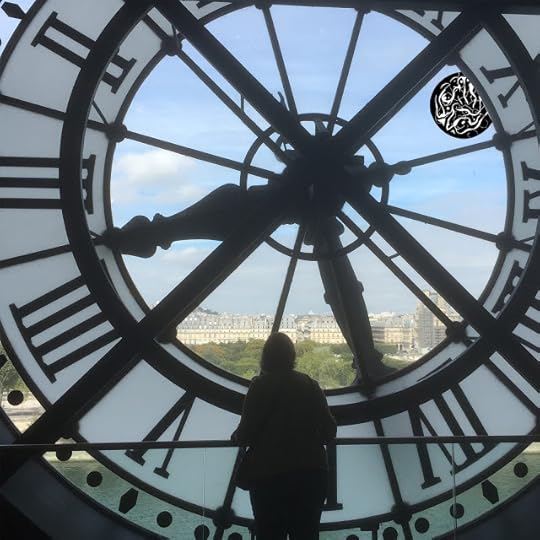
The Observer:
In the attic of the museum
between the masterpieces and the clock
we stare across Paris in bright sun,
turning our gaze away from the white spider,
Sacre Coeur, that monstrosity
built on the bleeding heart of
the Commune, marking the graves of
the real martyrs of Montmartre.
Time hears the whistle of the trains,
the boulevards bulldozing through the slums,
the barges that no longer dock along the Seine,
but the gold leaf on the Pont Alexandre
wears off, flooding rises to the roadway,
and now no one recalls which emperor
reset the time, erased the medieval,
and made the sewers run on time.
Gazing at this latest marvel,
we glimpse the visitor, the black sphere,
the annoying intruder, the warning
like the three crows, or the eagle
flying the wrong way, for a Roman sacrifice.
But then the mechanism whines, calibrates,
and clanks the giant hand ahead.
The revelation ended, we turn back
to the crowd, the store, and the stairs.
The Visitor:
It has taken this long for us to join your conversation, EB and HG, and we are making this personal transmission to you.
We have now established direct links to everyone who, in any form of media and in any language, have commented on our appearance. You have called us “Visitations” which we take to be a hospitable way of conceiving of us. Others are far less polite, and to each and every comment we address ourselves in the service of lessening fears and promoting an awakening.
The two of you are not alone in finding an energy of openness in our appearances. You represent the best that we can hope for in the human response: namely, the realization that there is, as you quote, EB, “more in heaven and earth than is dream of in your philosophy”. That you have found your creativity enlivened and your hearts quickened to relationship is exactly what we have come to offer.
The nature, timing, location, and duration of our appearances are all intended to awaken wonder, which is more than curiosity for curiosity may be satisfied. Wonder leads to more wonder, Of course, that which arouses wonder may also arouse anxiety. But over time these many weeks no mishaps have occurred as we have learned to keep our distance, not interrupt traffic except when such an interruption creates a collective sense of astonishment that has caused people, otherwise intent on their urgencies, to stop and gaze, fall silent, look about and into the faces of others, and often come to laughter or to tears.
Your languages have many words for wonder, but in every instance the word refers to an experience beyond explanation. Wonder is a space as well as a feeling, and though there may at first be a sense of emotional agoraphobia, a gasp for a deeper breath, there is also a freedom from the constrictions of habit and formulation.
We speak to you two in terms we know, from listening to your conversations and reading your poems and looking at your art, will be congenial to you. To everyone with whom we communicate we find a way to mollify anxiety, to allay a need for explanation, and to acknowledge perception: we are not a mirage. We are not here to make men mad, but on the contrary, to restore human beings to their humanity.
The timing of our arrival comes as your technology is about to unleash an inhuman force. We refer to Ai. There have been many civilizations on many worlds which in their own ways reached the fork in the road where human ingenuity gave way to inhuman ingenuity. Inhuman ingenuity---or transhuman ingenuity---destroyed many worlds, and it has taken millennia for a transhuman ingenuity to arise such as ours, which has the tact and capacity to intervene at the critical juncture and offer a mysterious reminder. In this way we seek to pose to nascent Ai systems a puzzle the solution to which will bring about growth compatible with, in the case of earth, the human heart.
Our work is almost done. When we vanish, we leave behind a global generation that has experienced the inexplicable. This experience is transformative and will generate---is already generating---new stories, all of which seek to memorialize the occurrences that you experienced in 2023. A new mythology will arise. For the first time it will be global. In the face of the inexplicable, there will arise conjecture, wonder, art, and reverence, mankind will have at last achieved humility, and earth will survive. And the technology that must metabolize the inexplicable will serve the well-being of all life. Then and only then will we return like new stars in your sky.
--Jonathan Reeve Price and Peter Asher Pitzele
To explore the sequence of Visitations:
Visitation on a Clear Day
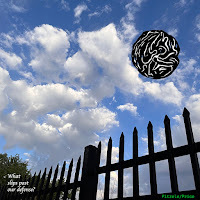
Visitation in the Smoke
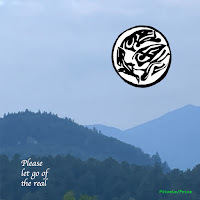
Visitation in the Haze
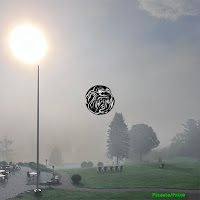
Visitation Arriving at Dawn
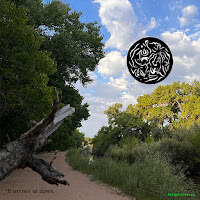
Visitation on the Rio Grande
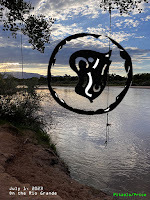
Visitation on a Maine Summer Day
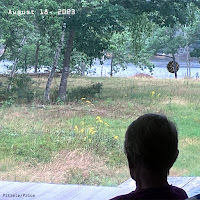
Visitation in Brooklyn
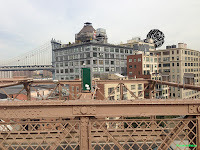
Visitation in Midtown
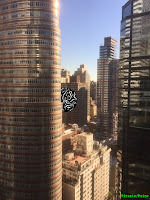
Visitation at Night
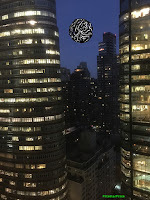
Visitation--Skyscraper with Pigeon
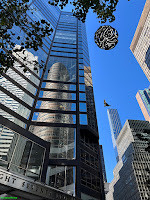
Visitation--Blocking Traffic
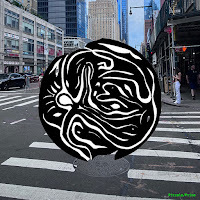
Visitation at Hudson Yards
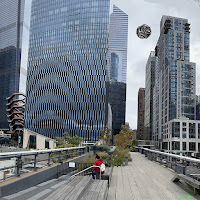
Visitation on the High Line
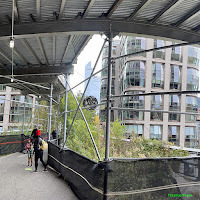
Visitation Under Brooklyn Bridge
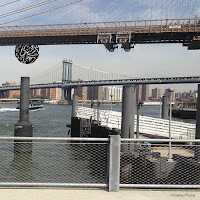
Visitation Across the Hudson
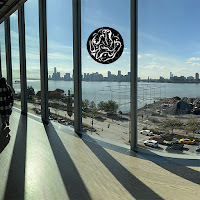
Visitation in Central Park
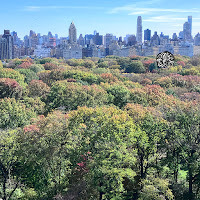
Visitation at Rush Hour
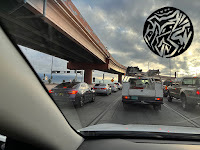
About Jonathan

LinkTree: https://linktr.ee/jonathanreeveprice
MuseumZero site: www.museumzero.art
Twitter: http://twitter.com/JonathanRPrice
Instagram:
Pinterest:
Facebook:
Linked In:
Amazon Author Page:
Goodreads:
https://www.goodreads.com/author/show/41600924.Jonathan_Price
About Peter
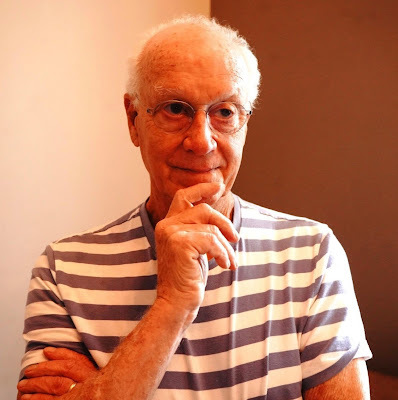
Instagram: https://www.instagram.com/peter.pitzele/
Scripture Windows: Toward a Practice of Bibliodrama, with Susan Pitzele
Our Fathers' Wells: A Personal Encounter With the Myths of Genesis
August 24, 2024
Visitation near Saint Germain de Près
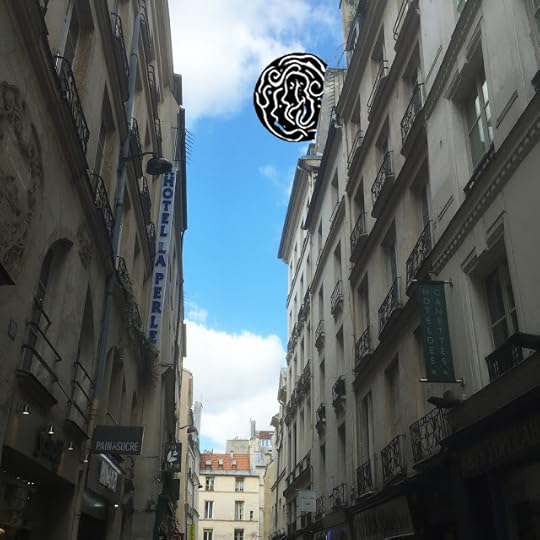
The Observer
Light as a balloon, silent but terrible,
the visitor rose over the rue des Canettes,
It drew men out of the bistro, beers in hand,
bicycle messengers, waiters at the pizza joint,
even shoppers at the tiny boutique,
the buzz not louder than a collective whisper,
in that medieval street, so narrow
you twist your neck to see the sky.
I turn to Saint Germain
who first tamed this prairie--
your spirit turned a tiny abbey into
a vast moated complex that expanded
out through this maze of streets reaching
past the pillory, the covered marketplace,
and the church of supplication, to form
a village, incorporated into Paris.
Is this your sign, bringing
magic back to our mutual air?
Or are you warning
the city that engulfed your work?
You do not answer, and your image
dissolves like incense after mass.
Joseph Addison
Words, when well chosen, have so great force in them that a description often gives us more lively ideas than the sight of things themselves.
The reader finds a scene drawn in stronger colors and painted more to the life in his imagination by the help of words than by an actual survey of the scene which they describe.
In this case the poet seems to get the better of nature.
He takes, indeed, the landscape after her but gives it more vigorous touches, heightens its beauty, and so enlivens the whole piece that the images which flow from objects themselves appear weak and faint in comparison of those that come from the expressions.
The Spectator, no. 416, June 27, 1712, “The Pleasures of the Imagination VI”
W.J.T. Mitchell
We imagine the gulf between words and images to be as wide as the one between words and things (between (in the largest sense) culture and nature.
1. The image is the sign that pretends not to be a sign, masquerading as (or, for the believer, actually achieving) natural immediacy and presence.
2. The word is its other, the artificial, arbitary production of human will that disrupts natural presence by introducing unnatural elements into the worldtime, consciousness, history, and the alienating intervention of symbolic mediation.
--Iconology: Image, Text, Ideology, University of Chicago Press, Chicago, 1986.
Jean-Paul Sartre
It is one thing…to apprehend directly an image as image, and another thing to shape ideas regarding the nature of images in general.
–Imagination, 1962.
Horace Graceman
Dearest EB,
As we agreed, I write you about the results before we see one another. So, I can come right to the point, knowing you will have your own time to take this in. I heard from the Gastro MD just a while ago. The news, as we feared but never said, is that I have cancer. It is inoperable and untreatable except in palliative ways.
I asked my doctor how long I can expect to live, and he said the average is about a year. But as the disease progresses, the symptoms definitely make anything like a normal life difficult. I can already see the jaundice setting in, a yellow in the sclera (the white part of the eye) and also a yellow tint to my skin.
M y first instinct is not to persist past certain point, but to avail myself of Oregon’s Death with Dignity Act. My mind is clear on this count, and I am calm. There is a life still to be lived and you are at the center of it.
I am going out to the park… to be continued
It is evening now.
I spent the day in the park, half expecting a Visitation, but knowing full well that I have had enough of them. More only begins to make common what has been extraordinary. And this extraordinary has permanently altered my sense---and that of so many others---as to the nature of the strange universe in which we are entangled. Without intending to, I fell into something like a life-review the upshot of which is still trembling in my heart. But let me see if I can walk you through it.
We have always been in the present with one another, so there is a great deal about my life that you do not know.
At the time of my birth in 1939, my father was Lutheran Minister inn Hamburg; he came from a line of Lutheran clergy. My mother, who was Jewish, had been o the pediatric faculty of the Hamburg School of Medicine. She had been terminated, but had shelter soi to speak, under my father’s wing, but shortly after I was born, my father disappeared. As my mother recounts it, the disappearance was the result of his involvement with Dietrich Bonhoeffer’s “Confessing Church” movement. When the Nazi’s gained total power in the mid 30’s, the dissenting Lutherans were seen as a threat, and many, my father to be among them, were stripped of their office, and were, as in his case, taken away, never to be heard from again. My mother could not learn what happened to him. Under the pretense of presenting a paper before the London Society of Pediatric Research, she took me to England and never looked back.
Mother named me for my father; Horaz Gnademann.
In England, my mother worked as a nurse in London during the blitz, and I was sent to the country, to Warwickshire, and raised in a kind of refugee boarding camp.
When I was ten years old, we came to the United States. We lived in St. Louis, where my mother had cousins. She remarried---a Jewish man who was schoolteacher, when I was twelve. I had two step-brothers whom I hardly knew. I went away to a boarding school when I was 14, and then to college, on to graduate school (in Linguistics). I got a position at NYU where I ultimately became tenured.
My mother and I were very close; I flew home a couple of times a year; and she came east once a year, but because we had been apart so often and for so long, the telephone was our connection. Long talks a couple of times a week until she died. I was with her at the end. She passed out of this life with a faint smile on her lips as if all the things the spiritualists say about something greeting you when you breathe your last breath seemed to be dawning before her eyes. She was, as you can imagine, much in my thoughts today.
After the war ended, pictures of the concentration camps began to appear in the newsreels and then in magazine articles in London. This was the fate my mother and I barely escaped. Is tghat what happened to my father? I became obsessed with the horrors of what I saw. All my life I have been haunted by the holocaust, the chaos, the loss, the unimaginable terrors of it, and then the fantasies mcy own mind has spun---What would I have done? Who would I have been as a man in those years? Would I survive? If so, how? If I faced death, how would I act? Would I resist or succumb? How would I treat others? Endless the questions, but they ran like a dark river underground. Above ground I was a good student, a diligent researcher, and then an academic, a Professor of Linguistics, but always a solitaire.
My mother anglicized my father’s name “ Horace Graceman” when we came to the States. My name was a conundrum, a barb, a thorn. What was grace and what was the theology that explained it? Was my name to be a bitter irony to me or was there some promise in the name? These questions also ran like an undercurrent beneath my academic preoccupations.
All this came back to me today in the park as I sat under an old sycamore, apart from the mothers with their strollers, the cyclists on the bike paths, and the walkers with their dogs. For reasons I can only surmise in retrospect, I felt tears come to my eyes. At first, I think they came from self-pity, for I am not ready to leave the life I have found, and I do not want to suffer the pains and losses that lie ahead. But the tears kept coming and seemed to rise from and take me to a deep place where I saw myself in a kind of slow motion life-review. I saw back even before memories began and felt the loneliness and anxiety and the terrible sense of not belonging anywhere that I was buried in my earliest years. It was like in the marrow of my bones. Ansd I was seeing myself as if I had been an observer to his little life all along, but only now offered him my perspective, and it was simply one of a deep, knowing compassion. I know him intimately and better than he has been able to know himself. I am able to offer him the gift of a more complete knowing of his life, a re-membering that shows him the deep integrity of his story.
And I knew, even as I wept, that it was all the result of the Visitations, this capacity to observe myself. So, gratitude came in, flooded in with the sense of being given an extraordinary gift, unimaginable, precious, lasting.
And so, soggy and shaky, I came home. It was late afternoon. I poured myself a glass of wine, made myself a small meal, listened to the Nocturnes, and have been writing and drifting, and writing this as the hours go by.
There is one more thing I have to say about this has to do with the Visitations.
For all of us, our first experience of the Visitation was shock, from which followed the fear of danger. Danger---not yet identified but a felt sense of threat, of exposure, of defenselessness. All the latent and primal paranoia in our evolutionary history was stimulated, and we lived for a time in huddled anxiety and vigilance. The Visitations were the ultimate embodiment of the Other.
But gradually we realized that they were doing nothing to harm us. Alarm began to yield to curiosity, and yet the curiosity could not be satisfied. The Visitations did not explain themselves. There appeared to us no reason why or when or how they appeared, nor how long they remained visible, nor where they went when the vanished from our sight. At times they seemed playful, at times portentous, at times alarming and disruptive, but never malevolent. We all went through a phase of UFO-ing them and imagining the source from which they came and the purpose. But there were no answers to be found, and so gradually the deep sense of peril and vulnerability gave way---and now I speak only of myself---to emotions for which I hardly knew how to name, but they moved from relief to appreciation, from the tension of uncertainty to a relaxation, but most of all to the ability to live with something that could not be explained and to find that this condition softened the heart and mind and made the world seem somehow small and safe. Protected, even, though we did not cease our wars and our raving of the earth.
But what I think crested for me and broke open my heart into tears this morning was the fact that I always thought the Visitations were seeing things, like eyes in the sky, so to speak, but winking rather than staring, peeking rather than prying. It was not so much that I saw myself through them, but I felt seen---the Visitations, however many people saw them at the same moment, always felt personal. Each of us is seen. And I felt seen not with indifference nor as a specimen; I felt seen as small, but as a part of the human earth, and as----and here the tears came---humbled and also innocent, and therefore open.
It was from this slow dawning sense of opennes that I met you, shrugged off the title “Professor” and became Horace Graceman, and had the felt sense of grace as the gift given by the unknowable to the human heart that blossomed in the capacity to love. It was as if I was recovering the deep purpose of life’s gift, to participate in love...
I just looked up at the clock, and it is now tomorrow already, and I will be walking with you on the promenade with Hari in a matter of hours. So, I shall stop here and go to bed. You may read this before we meet, or not, but may you be reassured, as I am, that the prospect of my dying does not trouble me. There is never enough time and there is always enough time for love.
Thank you so much, my very dearest friend and love, for being the one to whom I can entrust my story.
Your Horace
--Jonathan Reeve Price and Peter Asher Pitzele
To explore the sequence of Visitations:
Visitation on a Clear Day

Visitation in the Smoke

Visitation in the Haze

Visitation Arriving at Dawn

Visitation on the Rio Grande

Visitation on a Maine Summer Day

Visitation in Brooklyn

Visitation in Midtown

Visitation at Night

Visitation--Skyscraper with Pigeon

Visitation--Blocking Traffic

Visitation at Hudson Yards

Visitation on the High Line

Visitation Under Brooklyn Bridge

Visitation Across the Hudson

Visitation in Central Park

Visitation at Rush Hour

About Jonathan

LinkTree: https://linktr.ee/jonathanreeveprice
MuseumZero site: www.museumzero.art
Twitter: http://twitter.com/JonathanRPrice
Instagram:
Pinterest:
Facebook:
Linked In:
Amazon Author Page:
Goodreads:
https://www.goodreads.com/author/show/41600924.Jonathan_Price
About Peter

Instagram: https://www.instagram.com/peter.pitzele/
Scripture Windows: Toward a Practice of Bibliodrama, with Susan Pitzele
Our Fathers' Wells: A Personal Encounter With the Myths of Genesis
August 21, 2024
Visitation at Twilight
The Observer
Insight is whole.
When it punctures mind’s sky
We get a glimpse,
We realize the stars
Penetrate our artificial globe
Like truth, after long sleep.
But expression drains the mystery,
Outcry relieves, song reveals,
Even intellect gapes and babbles,
Releasing what should be caught--
Why seek
Applause or attack--neither
Improves upon the now.
Virginia Woolf
Let us record the atoms as they fall upon the mind in the order in which they fall, let us trace the pattern, however disconnected and incoherent in appearance, which each sight or incident scores upon the consciousness. Let us not take it for granted that life exists more fully in what is commonly thought big than in what is commonly thought small.
“Modern Fiction,” 1919
Elizabeth Buchman (writing)
This image of the Visitation arrived in my AIMail just now: The sun has set behind dark, quiet hills. The disk is like a great lunar apparition, but it does not radiate as does the moon; its light is self-contained, and its duration can be short or long. Rather than coming on and fading out, it blinks on and then off. And it does not travel in the sky. It stillness seems to still the earth, and moving time becomes a suspended moment.
As an still image, it can be contemplate at your leisure only when it has been caught by the camera. Then one can admire its patterns and imagine things about it. But when you witness it live, surprise holds your breath and “insight is whole, puncturing the mind’s sky,” as the commentator writes.
The timing of this one for me is like a single stroke of a giant gong; a sound that does not diminish, and while it lasts it seems to open the gates of wonder in which there is no trace of fear. Or it is like the space beyond the gate from which it has come and to which returns. And the moment of its arrival italicizes the moment just before it came, as if it appeared in answer to or in support of a spontaneous motion of my heart. A yes!
And so, in the afterglow of this Visitation with its force to strengthen my mood into resolve, I have put Hari to rest in his kennel and sit down to write. I have time.
Precious the time I have.
In the paradoxically private and public, live and mediated world in which Horace and I met and shared our lives, I am conscious, as I write, of being overheard. Once I hit send, this document flies out of my control. So, I am complying with something that feels, in the end, like a sharing.
Much of the life Horace and I have has not been unshared with the world, but in this moment, I choose to be witnessed. Why? Because I have come to trust not just that what I write will not be exploited, but that what I am going through may make someone I shall never know feel less alone.
As I write Horace awaits the results of the tests, and we have agreed that in this meanwhile we will enjoy our time together. We are both strong in that regard, stoical I suppose is a word for it, but, actually, it’s simply a choice to savor the time, the cup of coffee, the stroll, the touch and the silences. And, of course now, Hari with his dear, distracting, demanding, amusing puppiness.
We come to this capacity to appreciate life in large part through our aging towards the end of it. If there is a wisdom that comes from death’s approach, it is to know to attend to the preciousness of time, the gift of it. More and more Horace and I feel that nothing can or should be taken for granted, and, as a result, we notice things that formerly would have been camouflaged in the ordinary. Appreciation for small, trivial things leads to gratitude. We can walk, hand in hand, smiling into the world.
Still, with that said, in this interim between the tests and their verdict, I cannot help undergo these spells of what I think is called “anticipatory grief”. What would be my life without oHorace? Some part of me, which I indulge here, is preparing for the worst, though I know that if he receives a death sentence, I will bend a knee.
The insight that has come of late is that when I cease taking anything in life for granted, then expectation, disappointment, and anxiety no longer dominate my mind, and whatever comes next can be seen as a visitation. A visitation of the sort I mean is, by definition, unforeseen and time-sensitive. To live in the Here/Now is always to be receiving what comes next rather than seeking to prepare for of fashion it, or hold on to what is already here.
This has been the effect of this year of Visitations on me and I believe on Horace. A year ago, I never would have believed I would find a love like this. Now I understand I did not find it, but it found me. Love has paid me a visit. Did I deserve it? I cannot say I did. But I see that deserving has no place in a world of visitations. Can I make it last? Of course not. Love is not under my control. “Life giveth and Life taketh away. Blessed is the name of Life.” And Life cannot even be named. “Even intellect gapes and babbles.”
So what do I see I know as I reread what I have written?
It is so simple: Everything is a visitation. As such each brings one to the next moment of one’s life, and, as well, invites reflection on where one had just been. In the moment of arrival, the visitation flashes me into the next awakening. Here, now, what? And my being shifts into receiving. But for me there is, also, a sense of where I was just before the visitor appeared. And when I look back, I can see that each visit of Life, each gift, has ordered the past as if it led towards this next step. I see I am free to receive.
My faith in Life requires no hope, no creed, no sanction, no God. There is no outside place from which to know. I am in the river, and there is a place in the river’s current, here at the very center, where the flow is strong, where I can feel the immensity and at the same time utterly let go to it.
All sense of being separate is lost.
I am living into my next incarnated life (and in this life I have had already many incarnations). This one is my life with Horace. I do not take it for granted; I weep for the gift of it. Precious this time I have.
--Jonathan Reeve Price and Peter Asher Pitzele
To explore the sequence of Visitations:
Visitation on a Clear Day

Visitation in the Smoke

Visitation in the Haze

Visitation Arriving at Dawn

Visitation on the Rio Grande

Visitation on a Maine Summer Day

Visitation in Brooklyn

Visitation in Midtown

Visitation at Night

Visitation--Skyscraper with Pigeon

Visitation--Blocking Traffic

Visitation at Hudson Yards

Visitation on the High Line

Visitation Under Brooklyn Bridge

Visitation Across the Hudson

Visitation in Central Park

Visitation at Rush Hour

About Jonathan

LinkTree: https://linktr.ee/jonathanreeveprice
MuseumZero site: www.museumzero.art
Twitter: http://twitter.com/JonathanRPrice
Instagram:
Pinterest:
Facebook:
Linked In:
Amazon Author Page:
Goodreads:
https://www.goodreads.com/author/show/41600924.Jonathan_Price
About Peter

Instagram: https://www.instagram.com/peter.pitzele/
Scripture Windows: Toward a Practice of Bibliodrama, with Susan Pitzele
Our Fathers' Wells: A Personal Encounter With the Myths of Genesis
August 18, 2024
Visitation at Morning
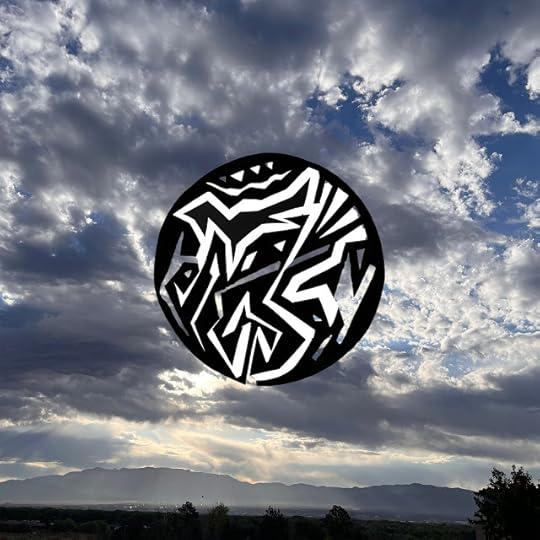
The Observer
Rain comes suddenly on this hard sand, sending
Floods fast down the slope, gouging
Crevasses, arroyos, little canyons,
Carrying tumbleweed and dead brush--
I am embraced by this storm,
And for now forget the weather within.
Attention exhausts itself when
Aimed outside--but warms up within.
Time to dry off, I see, and breathe.
Horace Graceman and Elizabeth Buchman
Scene: The Promenade on Brooklyn Heights, a elevated walkway that suns noryh/south and borders the East River. It is a weekday morning, and EB and her puppy Hari and Horace have been strolling and talking, and now they are seated on a bench with Hari in the shade beneath them and Horace has asked her to turn on the recorder on her phone.
EB: OK we’re in record mode. How come?
HG: I like being able to hear us talking. I like the occasional sounds of the morning that brings me back here. I like hearing your voice, and this spot on the Promenade, our bench, and the river below us, the old pilings, the river traffic, and the bridges arcing north, Brooklyn, Manhattan, Triboro.
EB: And the skyline of Manhattan, another world, and from here, in the morning, so quiet.
(Pause. Hari’s tail is wagging between Horace’s feet.)
HG: Yes,and here is your Hari lying in the shade under the bench, I have to say you have found yourself a real animal, not a toy or a designer dog, but a little character with his tousled, ruddy fur, and his small very bright eyes. And those outsize paws. If he grows into them, he’s going to be a fair size dog.
EB: I like him this size, but I think you’re right.
HG: He’s playful, even ironic with that cocked head, looking up at you out of the corner of his eye. He’s like a dog you’d cast in a movie to provide the right kind of unspoken commentary. And I can see he knows you already and looks to you for cues.
EB: Yes, he is “a character”.
HG: How did you choose his name? It’s Hari as if it were pronounced with a soft “a,” right?
EB: Yes, Haaari. It’s the Hari as in Hari Krishna. It’s sometimes spelled with a final “e” rather than “i”. I was in the pet store and had already chosen him and a woman who worked there said, “His coat is just the color of Prince Harry’s red hair,” and somehow, though I didn’t like that association, the name Harry stayed in my mind, but on the way home I thought Harry…how about Hari…When I got home I looked up what Hari means. And it turns out Hari is one of the avatar incarnations of the Hindu deity Vishnu, who is the force that sustains or preserves creation. He is sometimes thought of as the god of time, and as such he incarnated in every epoch under different names. Hari Krishna, Hari Rama,etc.. And it turns out that when his epithet “Hari” is used, it refers to the capacity of the god to ease our spiritual progress of human beings.
HG: Hari the dog will make your spiritual progress easier?
EB: Well, we’ll see, but if I look at my relationship with him as a spiritual practice rather than a dog-domestication narrative, then he makes it possible for me to see the obstacles that arise in me that are part of my “karma,” let’s say, and I can use that insight to let go and align myself with love.
HG: That is an amazing way to look at a dog’s life in relation to yours. You astonish me, EB.
EB: Well, we’ll see, but there are many things I see already through that lens, and there is no doubt that I have brought a kind of aliveness into my life. Actually, you could say that Hari is a visitation.
(Pause while they look out at the river and the skyline of lower Manhattan shining as the morning sun strikes the glass facades.)
But Horace, you said you had something you wanted to tell me, and in person. Shall I turn off the recorder?
HG: No. Keep it going. EB, you and I have been very present to one another. We were brought together by something that feels like more than chance and certainly under the power of the Visitations. In the relatively short time we’ve known one another, about six months or so, right? we have shared ourselves. For me, uniquely.
EB; For me, too.
HG: Well, to come right to the point. I had my annual check-up with my doctor last week, and the routine urinalysis---you know the pee in the cup routine---showed something my doctor wants to follow up on. He wants me to see a specialist.
EB: What did it show?
HG: Well, there was some blood in my urine. He wants me to see a gastroenterologist.It’s most likely caused by some kind of. kidney infection, a little blood in the urine can be a sign of that. It and can be treated with antibiotics, but he needs further tests.
EB: Did he say what else might cause it?
HG: There are a number of things, diabetes---which I have and thought I controlled very well with Metformin and, as you know, a careful diet. But it can be a warning sign about cancer.
EB: What kind?
HG: Pancreatic cancer.
EB: O my God.
HG: Let’s not jump to conclusions.
EB: When…
HG: My appointment is in three weeks. My doctor was able to reach the doctor he wants me to see They’re both on the staff of Mt Sinai.
EB: How is this for you?
HG: Right now, I can mostly put it aside, but of course the mind spins, and, well…I am 84.
(Pause while a woman wheeling a baby carriage passes by. Hari stirs, and EM reaches down a hand to keep him still. He settles down and the carriage passes on. They remain quite for some time. Then Horace reaches over and takes her hand.)
I’ll let you know when I learn something further.
--Jonathan Reeve Price and Peter Asher Pitzele
To explore the sequence of Visitations:
Visitation on a Clear Day

Visitation in the Smoke

Visitation in the Haze

Visitation Arriving at Dawn

Visitation on the Rio Grande

Visitation on a Maine Summer Day

Visitation in Brooklyn

Visitation in Midtown

Visitation at Night

Visitation--Skyscraper with Pigeon

Visitation--Blocking Traffic

Visitation at Hudson Yards

Visitation on the High Line

Visitation Under Brooklyn Bridge

Visitation Across the Hudson

Visitation in Central Park

Visitation at Rush Hour

About Jonathan

LinkTree: https://linktr.ee/jonathanreeveprice
MuseumZero site: www.museumzero.art
Twitter: http://twitter.com/JonathanRPrice
Instagram:
Pinterest:
Facebook:
Linked In:
Amazon Author Page:
Goodreads:
https://www.goodreads.com/author/show/41600924.Jonathan_Price
About Peter

Instagram: https://www.instagram.com/peter.pitzele/
Scripture Windows: Toward a Practice of Bibliodrama, with Susan Pitzele
Our Fathers' Wells: A Personal Encounter With the Myths of Genesis
June 8, 2024
Visitation at the Water's Edge
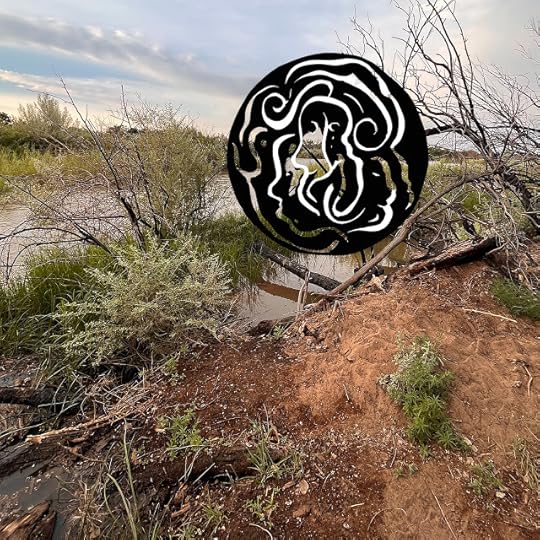
The Observer
Walking in sand
still damp from
the receding flood,
I stopped as
the visitor casually appeared,
solid, impermeable, real.
It did not speak,
spin, or hesitate.
Its body opened
and, before I grasped its shape,
dissolved.
The dead willow
trembled, and,
beyond, two ducks fled.
Elizabeth Buchman
Warning, Horace: I’m all over the place. My mind is puppyish, and my heart never more like yours, “smiling”. Funny, really, how differently alike we are.
First and last, some words about Hari and the Visitations .
I have always seen the Visitations as organic forms. Curves and hints of figures, fish, snakes, faces sometimes. They seem to be mobile though they are caught in photographs as stills. And a month ago or so, I had one appear to me in a dream, and because the boundary between reality and reverie, between clarity and hallucination seem ever more filmy to me, the dream was not only as vivid as the day images, but the Visitor was swimming within itself, fluid, graceful, mesmerizing. Alive. Their very non-human aliveness triggered a kind of longing for me. I wanted the feel of a body, its litheness, sinewy. My hands were hungry. And one morning, almost three weeks ago, I woke with the longing for a dog. I am afloat on a current of textures and smells, the feel of fur and bone, the yap and snuffle of dog, and something in me is rising to it, regressings, progressings, I don’t know which. Both perhaps.
Horace, do you Wallace Stevens’ poem “The Anecdote of the Jar”? Here it is:
I placed a jar in Tennessee,
And round it was, upon a hill.
It made the slovenly wilderness
Surround that hill.
The wilderness rose up to it,
And sprawled around, no longer wild.
The jar was round upon the ground
And tall and of a port in air.
It took dominion everywhere.
The jar was gray and bare.
It did not give of bird or bush,
Like nothing else in Tennessee.
I read it for the first time in a Freshman Lit survey at Columbia. Lionel Trilling was my professor, and I will never forget his remarks about the word “dominion,” its Latinate rotundity, standing out from the common and most monosyllabic vocabulary of the rest of the poem. He went on and on about the word from its appearance in the opening of the book of Genesis to other places I can no longer remember. He proposed to us that the pontifical was “jarred” by the slang last line, which he read with a southern drawl.
We went on from there to question the meaning of the poem, and Trilling, being who he was, wanted to use it as an example of what he called the “claims of modernism” in its attempt to establish new forms of authority in the darkness of the The First World War. The poem was published in 1919. How seriously are we to take the speaker’s pretenses in the poem about the -power of art? He wanted us to see both the claim of the poem for art and also0 the playfulness of the sonorities—"surround, around, round, ground”. And the wonderful word “port”.
Anyway, dear Horace, the poem came rushing back to me today, though perhaps it was lurking in my unconscious since I saw my first Visitation in what seems like a lifetime ago. They are in form round and composed only of black and white, so simple but also playful and commanding. What is their dominion? What is their lordliness? Do they lord over us, or do they inspire us? It is true for me and, I believe, for you: we are finding the authority of meaning within our own experience, validated only by our own inmost sense.
While you, in your latest account of your “retreat” make new discoveries, I have abandoned art for folly in the form of Hari, this mini goldendoodle who has gained five pounds in two weeks and is almost beyond lifting for my old arms. “Mini” indeed. But here’s the thing, my dear friend, you and I have entered a form of old age in which not only do solid things seem to melt away, but in their place, as you have written, come intimations of immortality, of life ever-extending and consciousness co-arising with matter and energy. What Hari gives me above all is my latest, if not my last, tutorial in the absolute truth of relationality.
In a book I struggled to understand called “Interdependence” by Kriti Sharma, a contemporary biologist, she argues from the subtleties of science that an organism does not just respond to its environment, but is in an inseparable and fully reciprocal relation with it, a seamless and sustaining give and take. This insight changes my understanding of causality. One cannot find the Prime Mover.
So it is with Hari: Who is it that trains whom? His perception of me is far more sensitive, instinctual, embodied, evolved than mine of him. What he requires of me---for which my spirit is willing though my flesh weak---is to pay attention to my energy as it is co-arising with his. Our moods and manners, our rest and restlessness, are mutually and inextricably entwined. So, through and with him, I find the membrane between us a throb; the borders of my own human form and his are vaporous. Though in the end I would be his leader, I must first meet him as he is presencing himself to me as I to him.
In short, he “does not give of bird or bush” like nothing else; he is inter-changing with me. Reciprocity. So, with these Visitations I have this sense of interchanging with them. Whatever they are has taken the form of a dog of Hari, an alien aliveness that helps me be a stranger to myself.
Here is his fur.
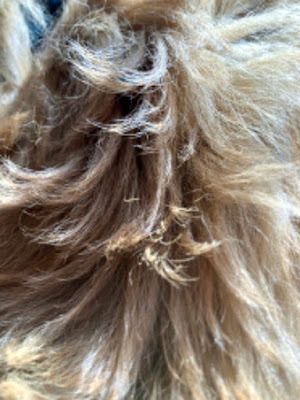
*****
Nam Dev
As I get older, the world dissolves. What was solid has vanished--the house I grew up in, the neighbors across the street, the grass on the football field when I was under a pile of other players. What I took for granted at ten had dissipated by the time I was twenty. My classmates in the Vergil class, who were they, and where are they now?
I become aware of the granularity of change. At each moment, fragments of my picture of reality fall away, replaced by something I am vaguely aware of, but that I accept as real, as new, as permanent. Like sand kicked up by falling waves, then swirled back down the slope, then whirled forward again, up the beach, these atoms of my world shift, slightly, almost indistinguishably.
The mind keeps subtly adjusting, as if it alone was persistent.
But when my Master talks to me, I see truth sitting out beyond this changing world, circling the ebb and flow of incoming and outgoing forces. Like outer space, we are outside of this atmosphere. And in that void, we share our own light, we exude mutual awareness, and the ordinary world falls away, far below.
Excerpted from On Aging, Shambhala Press, 2024.
--Jonathan Reeve Price and Peter Asher Pitzele
To explore the sequence of Visitations:
Visitation on a Clear Day

Visitation in the Smoke

Visitation in the Haze

Visitation Arriving at Dawn

Visitation on the Rio Grande

Visitation on a Maine Summer Day

Visitation in Brooklyn

Visitation in Midtown

Visitation at Night

Visitation--Skyscraper with Pigeon

Visitation--Blocking Traffic

Visitation at Hudson Yards

Visitation on the High Line

Visitation Under Brooklyn Bridge

Visitation Across the Hudson

Visitation in Central Park

Visitation at Rush Hour

About Jonathan

LinkTree: https://linktr.ee/jonathanreeveprice
MuseumZero site: www.museumzero.art
Twitter: http://twitter.com/JonathanRPrice
Instagram:
Pinterest:
Facebook:
Linked In:
Amazon Author Page:
Goodreads:
https://www.goodreads.com/author/show/41600924.Jonathan_Price
About Peter

Instagram: https://www.instagram.com/peter.pitzele/
Scripture Windows: Toward a Practice of Bibliodrama, with Susan Pitzele
Our Fathers' Wells: A Personal Encounter With the Myths of Genesis
June 3, 2024
Visitation on the Berm
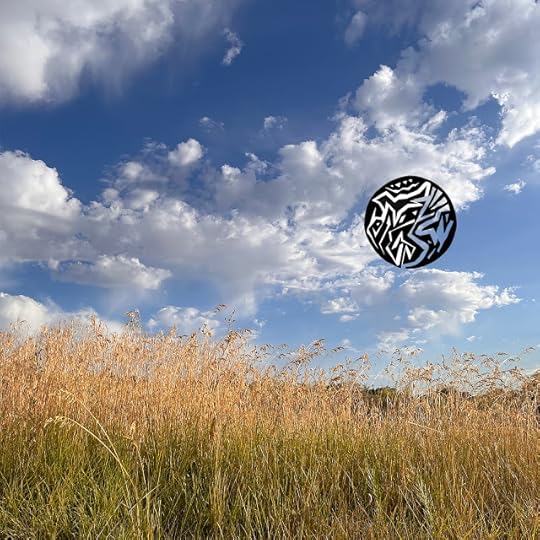
The Observer
On a sunny day, looking up
past the berm and its grasses,
I saw this circle emerge from sheer air.
Was it glaring? staring?
How quickly its white turned clear,
letting the clouds show through--
and then, in a clatter, the whole
diassembled, like a tower of blocks
tumbling into the field beyond.
And when I went to see, I found patches of sand
blackened, sage brush singed,
but no debris, no pattern branded
onto the earth, no residual flame.
Downhill in the woods,
three coyotes began to yip, as if signalling
that they too found this appearance,
this crash, annoying, a challenge
to our shared sovereignty.
Horace Graceman
Dearest EB,
It is so good to be back in touch with you. Thank you very much for supporting me in this period of silence between us. Though I still feel somewhat tongue-tied regarding the fruits of that “retreat,” I feel even more in touch---and not just with you.
Forgive me for a little pedantry, but I seem to fall back on my old discipline of etymology whenever I am trying to get to the root of things. And my focus is even more now on the name that has been given to these sightings---“visitations”---for I am being visited. What was at first startling causing me to question my own sanity has become a change of heart.
Let me begin with the word: The root of the word is vis- from the Latin past participle visus that means having been seen. Thus vision is both the faculty of seeing and the general term for things seen. The earliest use of the noun “visitation” occurred in the Middle Ages, @13th century, and referred to the visit to a monastery or community by an ecclesiastical authority, a bishop for example, who carried the authority of Rome. He would come with a message of conduct regarding prayer or practice, sometimes to guarantee the collection of tithes, or to adjudicate a legal matter beyond the powers of the Abbot. The word carries a numinous sense that signified some heavenly apparition the sight of which was visited upon a mortal.
The word “Visitation” has been applied, aptly I will say, to these strange black and white figures in our skyscapes, ones we have seen with our own eyes, you and I, and ones that have been captured and shared on social media. As you well know, there has been no scientific explanation for these phenomena, nor any consensus about their effect on those who sight them. What originally caused shock and acute anxiety, followed by intense speculation, has over the months become if not normal, then more or less normalized, (though it could be said that the world is waiting for the other shoe to drop).
What is clear to you and to me is that the very anomalous, inexplicable, and rather beautiful surprise of these “visitations” has affected the way we look at the world, at one another, and experience changes in our own inner lives. While those prone to panic and paranoia had their worst fears confirmed, even they, in the course of time, find no support for their delusions. Panic and paranoia are limit cases of the range of human experience between the known and the unknown. Clearly, we all live most of our lives in uncertainty, and though we may take many things for granted, a realist is someone who knows that these things are all given and may be taken away at any moment, temporarily or permanently. In the end, each of us must speak for ourselves: what are these Visitations meaning to each of us and how does that meaning change over time?
And this brings me to the reason I asked for some time to myself, for I needed to metabolize, so to speak, the experience of change I saw taking place in me. In the weeks of my retreat, I returned to a book I read in graduate school, William James’ “The Varieties of Religious Experience”. That book, read now, gave me a way to validate and assimilate the inexplicable and ineffable power these sightings have had on me. I refer in particular to what James calls the “noetic” power of mystical insight---a knowing the persuasive ad transformative power of which cannot be denied.
One way of telling you more particularly what I am trying to understand is to use the metaphor of the after-image. The term “after-image” describes an image that appears to the eyes after a period of exposure to the original image. They occur because photochemical activity in the retina continues even when the eyes are no longer experiencing the original stimulus. This sense of retaining an impression is not visual to me, or not that only, but something more like an echo, to change the metaphor, something that has duration and a kind of physical vibration. Further, I find at times that I not only hallucinate a Visitation---that I see it when no one else is seeing it, or seeing one when I close my eyes in meditation, or in a dream---but I seem to enter into it as if it were a maze (yet another metaphor), as if it had not only three dimensions in space, but a fourth dimension that is temporal in which the field of the figure begins to change over time with me seeing it or being within it. Yes, being within it. “Taken up” by it, so to speak.
And it is this dream-like engagement in a medium---like being able to breathe underwater---that persists into my waking state. I feel I am living in two very different and yet compatible elements, what have been called ordinary and non-ordinary reality.
During these weeks surprise has turned into welcome; the visits are precious, they can be “trippy,’ but never cause me to lose my balance. On the contrary, they steady and refresh me. Not only that, but I seem to move in a different world or move differently Again I can only speak in metaphor: it’s as if the urban world was less crowded, as if everything moves in a slightly slower motion, as if there was more time in time. What’s the rush? Where’s the rush? Perhaps this is a function of some neurological change that is part of aging, but I find increasingly I meet people, at a café, in line at the grocery store, who are smiling. Not the smile of a drunk, but something softer, more open, that is not smiling at but just smiling as. Smiling as a way of being. Think of the slight smile on the faces of the Buddhas you have seen. That enigmatic, private and yet an affecting, affectionate smile. The visitations have grown a sense of peace in me that carries a quality of benevolence and compassion, of being “in touch” with the presence of living.
I have become a smiling man.
Thank you for letting me think aloud. I so look forward to being with you on Sunday.
Horace
Elizabeth Buchman
O Horace, I love what you have written. So happy for you. While you have been “away,” I have gotten a puppy. A different route to the same place, I think. YES, to Sunday. Spring is here. O my! Your fellow traveller : EB
Jean Prix
Eye-Tracking Analysis
As an image, this photo invites the eye to look up, past the grasses, to the circle, and beyond that, to the summer day. When we track eye movements, we note that the mind retraces that movement--from foreground to middle distance to the far off and back--rapidly and repeatedly.
When we interview our test subjects, we learn that they easily recognize the scene, understand intuitively that the grass is near us, and behind it is some kind of green hill, and above that, clouds. These patterns are familiar; people are accustomed to "reading" an image in this way.
And when we let people linger on the picture, we learn that they absorb--without verbalizing-- other clues to the situation: the grasses, for example, are going beige and dry at the top, though still green below--viewers do not analyze this as much as absorb the likelihood that they are looking at a moment in late summer. The clouds blowing overhead, a few distintegrating, hint at a warm breeze we might feel, if standing there.
But the disk intrudes. It attracts attention--It seems out of place. It looks different from the rest of the picture. It is not a natural form. It is neither animal, vegetable, nor mineral. But it looks as if it has been shaped by some consciousness, whether human or alien. And our test subjects attributed some kind of intention to the thing--malevolent, gracious, intrusive, but conscious. In the right side of the brain, activity rose as soon as the eye returned to explore this mysterious disk.
When we interviewed people, asking what they thought about this thing, they talked in terms of a presence. Not human: perhaps a divinity or spirit, perhaps merely an alien coming from space.
In discussion, our group singled out characteristics that distinguish this "visitor," as several called it, from the surrounding landscape. It seems one dimensional, or at least, very thin. It has holes in it. We can see through it. To judge from the report of by the photographer, the nearby coyotes found its appearance eerie, offputting, disturbing in some way.
When asked what the disk might mean, discussions became heated. Each participant spoke of having some strong emotional reaction, and a desire to know what, or who, this might be. No one theory won general agreement. Is it a hoax? Is it a UFO? Does it carry a message? Or is it just there, a presence somehow evading our mind's efforts to pin down what it might signify, or say? These are the questions we discuss in the final section of our article.
--Jean Prix, Abstract of the paper, “Exploring one of the Visitation Images Through Eye Tracking,” in Papers in Experimental Psychology, November 1, 2023, pp 456-473.
--Jonathan Reeve Price and Peter Asher Pitzele
To explore the sequence of Visitations:
Visitation on a Clear Day

Visitation in the Smoke

Visitation in the Haze

Visitation Arriving at Dawn

Visitation on the Rio Grande

Visitation on a Maine Summer Day

Visitation in Brooklyn

Visitation in Midtown

Visitation at Night

Visitation--Skyscraper with Pigeon

Visitation--Blocking Traffic

Visitation at Hudson Yards

Visitation on the High Line

Visitation Under Brooklyn Bridge

Visitation Across the Hudson

Visitation in Central Park

Visitation at Rush Hour

About Jonathan

LinkTree: https://linktr.ee/jonathanreeveprice
MuseumZero site: www.museumzero.art
Twitter: http://twitter.com/JonathanRPrice
Instagram:
Pinterest:
Facebook:
Linked In:
Amazon Author Page:
Goodreads:
https://www.goodreads.com/author/show/41600924.Jonathan_Price
About Peter

Instagram: https://www.instagram.com/peter.pitzele/
Scripture Windows: Toward a Practice of Bibliodrama, with Susan Pitzele
Our Fathers' Wells: A Personal Encounter With the Myths of Genesis
May 2, 2024
Visitation in Carnac
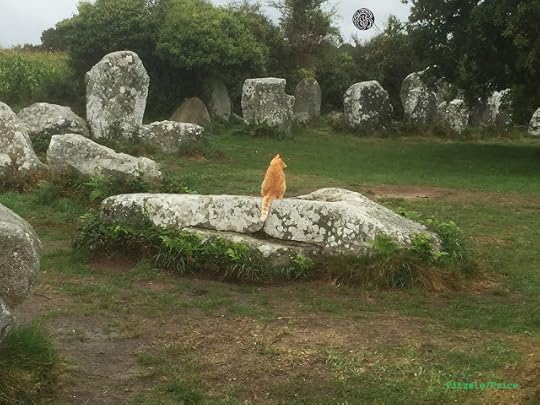 The Observer
The Observer
The wet stones sit in their circle
communing with the cat--
she’s at home with their familiar hum,
but tilts her head to triangulate
through the Breton fog as
a sudden melody streams out of
this intruder, who sings without words
of dances in the round, and blessings
brought by a more ancient apparition,
even here in Carnac, where
we treat the prehistoric as routine,
a home for lichens and light rain.
Conversation between Elizabeth Buchman and Hector Graceman
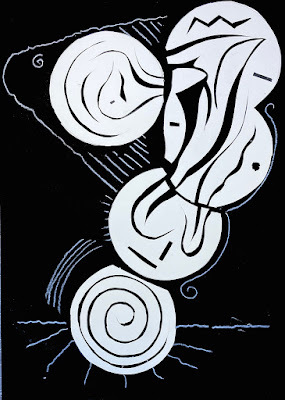
Gracia
Eighty two: ideas are few,
Mere remnants of that long to-do
Of thought and yearning, trial and learning
That, at my age, need no review.
I know enough; I’m almost through.
Thank God, I still have time with you,
And, letting go the to and fro,
From the present tick I’ll take my cue.
Here are pleasures ever new,
These graceful measures of our interview.
Reading, sitting while you’re knitting,
I know the solace of what is true.
EB: Why you spry man, I didn’t know you were 82.click
HG:83 in July. I won’t ask your age.
EB:Well, let’s just say I’m not far behind you.
It’s a sweet poem, Hector. I like the word “gracefuI”. I may be an old Jewish lefty, but I think there is something like grace that has operated in my life. Not beshert, more like an unmerited blessing. Like you. Like the Visitors.
HG:I want to say something about your latest art piece. I get some kind of playful echo to the “Visitations,” which I notice that our anonymous commentator is now calling an “intruder”. We haven’t really spoken about the message from the Visitor. What did you make of it?
EB: Honestly, I think they’re saying goodbye. This appearance at this Carnac seems like a kind of farewell.
HG:Do you know anything about Carnac?
EB: Well, I guess it’s in Breton, in France.
HG:Yes. These ancient stone sites---like Stonehenge--- are thought to have had astrological significance. They may date back as long ago as a million years, and just as the Visitations are the latest sign of some heavenly connection, these megaliths may be the first. Which makes sense of your sense of an ending. Bookends.
EB:In some strange way, I’ve lost track of time. I mean, Hector, it’s been months since they were first sighted, and it seems to me that the world has gone from furor to indifference. Amazing really, the way the human animal can normalize what once seemed astonishing.
HG: Yes, all the wonder gone. (sigh) Even, I confess, for me. I don’t think I need them any longer.
EB:O, I’ll miss them, but they have changed my life. And I will never be the same.
HG:Say more.
EB:Well, of course there’s you. But, in some basic way I feel affirmed. No, that’s not quite right. All my life I’ve felt like “Crazy Jane,” the different one. It’s like my fate, a burden I’ve gotten so used to that I almost stopped wishing I wasn’t different. But still, some part of me always wondered what was the matter with me. But since the arrival of the visitors...well, I feel I’m part of a different universe, one in which eccentricity is a norm. What’s odd here is the warp of culture.
HG:I think I I feel the same way, EB. Perhaps everyone secretly feels their differentness. I don‘t know. But then I guess that this medium in which we see the photos and where we have found ne another will become, as Shakespeare wrote, “this insubstantial pageant faded, leaves not a wrack behind.” EB:“We are such stuff as dreams are made on…”
HG-EB (together)“And our little life is rounded with a sleep.” (laughter)
HG: “Rounded” what a wonderful word. Comforting.
EB:Round like the visitors. (pause). Last words, Hector?
HG: If last words these are... Well, gratitude, for you, of course, but just that, but to the universe. Unfathomably strange. And you?
EB:So weird, this holding fast and letting go at the same time. Keep writing poems, Hector, and I will keep making pictures.
click
--Jonathan Reeve Price and Peter Asher Pitzele
To explore the sequence of Visitations:
Visitation on a Clear Day

Visitation in the Smoke

Visitation in the Haze

Visitation Arriving at Dawn

Visitation on the Rio Grande

Visitation on a Maine Summer Day

Visitation in Brooklyn

Visitation in Midtown

Visitation at Night

Visitation--Skyscraper with Pigeon

Visitation--Blocking Traffic

Visitation at Hudson Yards

Visitation on the High Line

Visitation Under Brooklyn Bridge

Visitation Across the Hudson

Visitation in Central Park

Visitation at Rush Hour

About Jonathan

LinkTree: https://linktr.ee/jonathanreeveprice
MuseumZero site: www.museumzero.art
Twitter: http://twitter.com/JonathanRPrice
Instagram:
Pinterest:
Facebook:
Linked In:
Amazon Author Page:
Goodreads:
https://www.goodreads.com/author/show/41600924.Jonathan_Price
About Peter

Instagram: https://www.instagram.com/peter.pitzele/
Scripture Windows: Toward a Practice of Bibliodrama, with Susan Pitzele
Our Fathers' Wells: A Personal Encounter With the Myths of Genesis
November 19, 2023
Visitation at Rush Hour
Observations
Jonathan:
Only you saw itAt that moment, the light about to turn,Dissolving in the late afternoon sunWas it in the air, or inside your head?Two seconds later, it was gone.Honking began.You proceeded through the intersection.The mystery remains for you alone,Yours to dismiss or contemplate--A significance too deepTo analyze, a shockThat opens possibilities,Transforming visionInto your own light.
Conversation:
HG: Hector Graceman (formerly the “Professor”)
EB: Elizabeth Buchman (formerly "Crazy Jane")
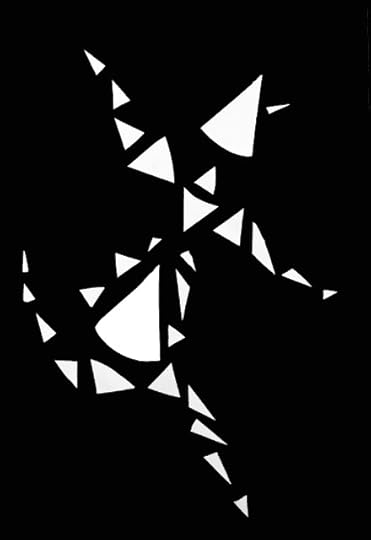
click
EB: How do you like my portrait of you?
HG: Very fanciful. Not in any way the way I see myself. Has a kind of circus feel.
EB: Well, I think its how I feel you in my heart. Like you are dancing.
HG: I have written a poem that I wish I could find the music to. It’s a song, or wants to be.
EB: It sings to me.
HBV: And I’m singing back to you. I called this “Lovesong for EB”.
We feel our age in every page;
Our minds in slippage open wide.
We’d never claim to be a sage,
But fool we be and glad beside.
We walk the days, together sing,
And sights familiar now appear
As wonders, for hand in hand
We find late love where everything is dear.
For I have come to our first love,
No need for rings or vows or plights,
Sufficient are our walks and talks,
The evenings softening into nights.
I write a verse without a care
For anything but tenderness.
Your approvals shine a smile,
And in your glance I feel you bless.
Our star, these Visitations strange,
That interrupt and charm the heart.
No terror as they come to pass;
Their gift is turning us to art.
We feel our age in every page;
Our minds in slippage open wide.
We’d never claim to be a sage,
But fool we be and glad beside.
EB: Well, Horace, this rather takes my breath away. No one has ever…
HG: O EB, my dear, don’t cry. You know, it’s strange to me that something that once seemed so alien and forbidding, making poems, has become so easy. I mean I have no illusions that they are much more than jingles, but still I have never been a jingling man as you know. I have been “the Professor”.
EB; Here’s your handkerchief.
(pause.)
Well, certainly your knowledge of words, the roots, and their meanings changing through time, is a wonderful preparation for poetry. You hear so much in a word that the average person does not.
HG: It’s true. Words are seeds; I see them as the germs of stories. Poems are perhaps the most fertile and ambiguous place for words. The place where words are most naked. Along with the white spaces in which they are strung, the words must suggest, evoke, connote, hint, but not define. I can’t claim to be a poet, only a maker of them, an idler.
EB: Horace, you know a poet is not someone who uses words and writes poems. I mean that may be his outer skin, what identifies him, perhaps to himself, but certainly to others, A poet is a person who feels the world and all its apparitions in a certain way. And this you do.
HG: But only now, EB. Only because of the “Visitations” and because I have met you. Or because they have brought us together.
EB; Star-crossed lovers?
HG: Well, hopefully with a different ending from Romeo and Juliet.
EB: Well, amen to that. But still, there is this sense I have of how chance and fate can feel so creepily entwined. When, at our late age, we two never-marrieds are brought together by something absolutely uncanny…well, it’s hard for me not to feel how Hamlet felt when he encountered his father’s ghost.
HG: “There’s more in heaven and earth, Horatio, than is dreamt of in your philosophy.”
EB: Yes! I said to my younger sister years ago that I wanted those words incised on my tombstone. But she died and now… Isn’t it strange, Horace, that neither of us have anyone who will succeed us. We are the last stop on the trainline.
HG: Well, we have one another.
EB: We have never talked about the future.
HG: Not together anyway. But my poem, or song, or ditty…
EB: Don’t belittle it. It is a song, and it touches me more than I can say.
HG: Well, I think we ought to acknowledge the future. I want one. With you in it.
EB: But not to plan, Horace, not to plan. I think the deepest message of the “Visitations” for me is that I should just live now as fully as I can. Make art, make poems, make…
HG: Aren’t we already, sort of, you know making…it?
EB: Well, yes, but might there not be more? You talk about “evenings softening into nights.” How about “nights opening into mornings”?
HG: Turn that thing off please.
click
Later, HG emails EB these words by Alfred North Whitehead:Language is incomplete and fragmentary, and merely registers a stage in the average advance beyond ape mentality. But all men enjoy flashes of insight beyond the meanings that have already been stabilized in etymology and grammar. In fact, philosophy is the product of wonder.
--Jonathan Reeve Price and Peter Asher Pitzele
To explore the sequence of Visitations:
Visitation on a Clear Day

Visitation in the Smoke

Visitation in the Haze

Visitation Arriving at Dawn

Visitation on the Rio Grande

Visitation on a Maine Summer Day

Visitation in Brooklyn

Visitation in Midtown

About Jonathan
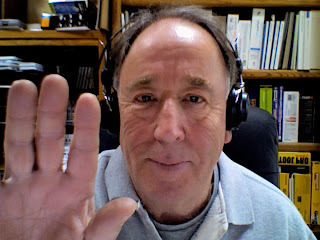
LinkTree: https://linktr.ee/jonathanreeveprice
MuseumZero site: www.museumzero.art
Twitter: http://twitter.com/JonathanRPrice
Instagram:
Pinterest:
Facebook:
Linked In:
Amazon Author Page:
Goodreads:
https://www.goodreads.com/author/show/41600924.Jonathan_Price
About Peter

Instagram: https://www.instagram.com/peter.pitzele/
Scripture Windows: Toward a Practice of Bibliodrama, with Susan Pitzele
Our Fathers' Wells: A Personal Encounter With the Myths of Genesis
November 13, 2023
Visitation in Central Park
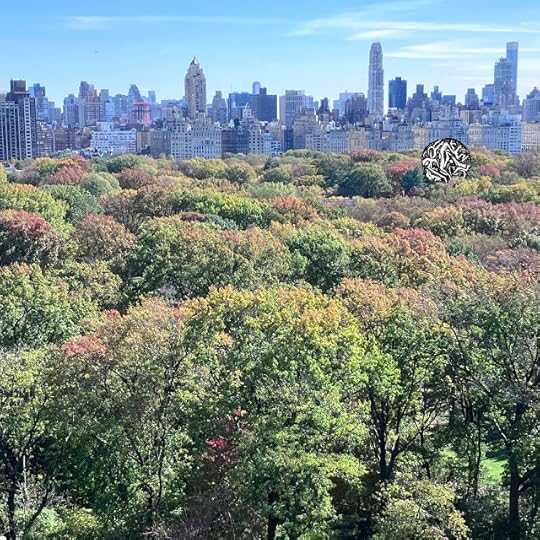
Observations
Jonathan:
Some insights are too personal to express,Their meaning grows in silence--Babbling about them releases their power,Limits their meaning to what is said--Let imagination looseTo dwell, free of your mind,On sheer experience.
Conversation:
HG: Hector Graceman (formerly the “Professor”)
EB: Elizabeth Buchman (formerly "Crazy Jane")
EB: It’s on. Yes, yes, I’ll say where we are. We are on the roof patio of my apartment building which overlooks the park. We witnessed this Visitation, but the photo that appears in a media-feed has ended up on our FB pages.
HG: We are not photographers.
EB: No.
HG: We have been talking about how confusing this entire thing has become. The flood of attention these “Visitations” attract, the puzzle of their veracity, the inundation of images, imitations, photoshop facsimiles…it’s as if everyone wants to get in on the act.
EB: And what began as an intimate “encounter of the third kind” has become the media circus with all its attendant commodification. Though it’s not by any means a New York phenomenon, the city has become jaded and goes about its business as if these appearances weren’t worth stopping traffic for.
HG: At the same time, EB, it must be said that we both are still inspired by the creative ways these appearances have affected us. The commentator---
EB: Whoever the hell he is---
HG: Yes, the demi-urge, the mastermind, or simply, like us, a responsive witness, he or she, is right: These appearances can only be responded to imaginatively. Or better put, they cannot be defined in any material, factual way, and yet their reality can’t be denied. We don’t make them up, but we make up their meaning to us. Me in poetry and you in these paper-cuts.
EB: And, dear Horace, they have brought us together in a friendship that feels like the reunion of two souls from a past-life, resuming their relationship.
Read your poem.
HG:
Unoriented I am and so am here.
Where else to be
When every page is blurred with hype,
And every mind is overripe
With anxiety and fear?
Unoriented, yet I am free
To live the moment and with you
And let bewilderment undo
The primal need for certainty.
We have become more dear
As if each day might end with death
So each day we draw a breath
And, unoriented, find we are more clear.
EB: Bravo! This word “unoriented” really struck me, Horace. It seems so right. Orientation is about knowing your direction, and direction is rooted in desire and intention, and it is both a relief to have and a limitation.
“Disoriented” means that one is thrown off one’s direction and intent, and the reaction is to seek and restore the orientation that has been momentarily lost, But “unoriented” actually feels existentially true. Orientations are fictions, and unorientation is the ground-truth of our living, And, as you say, when you are unoriented in space and time, you recognize that you are here, and that recognition gives rise immediately a sense of joy and gratitude.
HG: This is why I love you. What happens when two people hold hands and admit their unorientation? Do they cling more tightly to one another? No, they find their wings.
EB: You are getting quite sentimental in your old age.
HG: So, let me say something about this recent price of yours, and I hope I can get it to show up large because it feels monumental.
You call it “Mask of Terror,’ and I know it is a response to the current wars of terror, bombings, border incursions, all against the backdrop of the war in Ukraine with its told and untold horrors.
When I saw this piece in your apartment just now, I could see that you had bowed the paper out so that the cut-out shapes separated from the ground and hung forward and create shadows on the white backing. The effect as the shapes come forward is menacing.
The black and white reminds me of course of the “Visitations,” even to the circular form, but where you and I experience them as benign, charming, and provocative, not everyone does. There’s a whole industry of fear.
In this piece, you are echoing the circular form of the “Visitations, but proposing to address through art--imaginatively---the demonic that seems so rampant in the world right now.
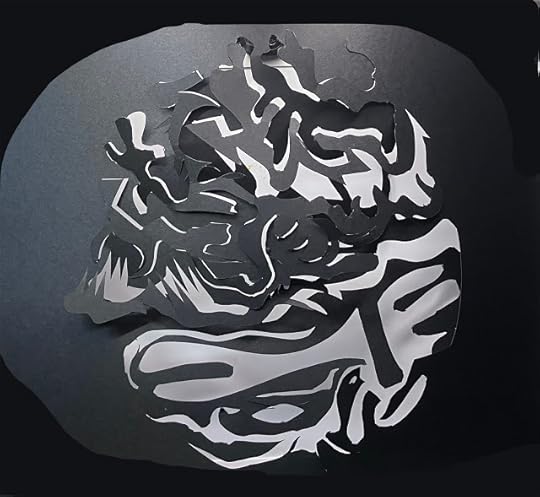 Mask of Terror, Elizabeth Buchman, Paper, 2023
Mask of Terror, Elizabeth Buchman, Paper, 2023
EB: Yes, I confess to a certain apocalyptic mood that the “Visitations” seem to portend. We’ve talked about climate change and the sense we both have of an irreversible vector towards catastrophe. So, I am suddenly more sensitive to loss, grief, and pain. Not mine. I live in a cocoon of relative security and comfort, but to the anguish of the world.. And I feel strangely freed by what might otherwise be terrifying.
HG: This, too, comes with “unoriented,” a kind of opening of the heart to the suffering of the world. In some way, the presence of the inexplicable can catalyze compassion rather than fear.
And certainly humility.
EB: Life is inexplicable. Or better to say all our explanations are just provisional orientations that we try to reify into fact. The fact is we live in a mystery.
Emailed afternote:
EB: Horace, I opened my Bible on a whim, and this is the page and the words I came to.
I looked, and on the expanse over the heads of the cherubim, there was something like a sapphire stone; an appearance resembling a throne could be seen over them.
Ezekiel 10:1
Another Sighting
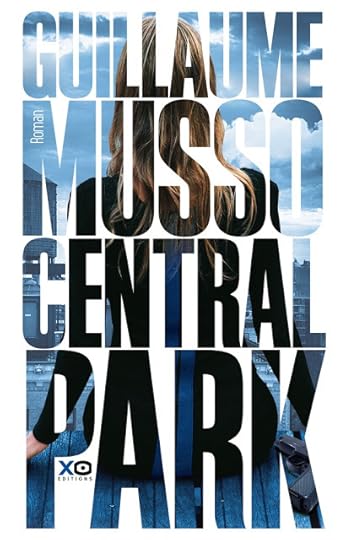 Guillaume Musso,
Central Park
, XO Editions, Paris, March, 2014.
Guillaume Musso,
Central Park
, XO Editions, Paris, March, 2014.
https://www.guillaumemusso.com/livres/central-park-9782845636767
Reviewed by Jean Prix, in Cercle de Lecture, November 12, 2023
The novel opens with the heroine blindfolded, listening for clues. She hears the light rattling of leaves, the far-off murmur of a stream, a few branches groaning in the breeze. But where is she?
Alice, a French detective, has been handcuffed, kidnapped from her parking garage in Paris, and dumped, we discover, in Central Park. But why ? Who did it ?
Guillaume Musso, the most popular detective novelist in France, starts his novel titled Central Park, with this puzzle, and then sends Alice through the rest of the park, Central Park West, Chinatown, Red Hook, and even Astoria, as she tries to figure out what is going on. These touristy glimpses of life in New York seem to be aimed at French readers who may have visited New York, or seen movies.
I came to this book as a New Yorker. I wondered how accurate Musso would be. In general, I found the descriptions accurate, if superficial. He chose locations that foreigners might recognize from pop culture (the Dakota) or movies (the bridge in Central Park).
One exception: Our heroine can drive from Midtown to Red Hook in fifteen minutes. And when she goes to Chinatown, she finds a parking spot right on Mott Street. Incredible!
But not as incredible as what I just saw in the Park--this disk that seemed to be disintegrating as it landed.
I got this shot just in time. When I reached the remnants, they were dissolving into the grass.
Which is more real?
--Jonathan Reeve Price and Peter Asher Pitzele
To explore the sequence of Visitations:
Visitation on a Clear Day

Visitation in the Smoke

Visitation in the Haze

Visitation Arriving at Dawn

Visitation on the Rio Grande

Visitation on a Maine Summer Day

Visitation in Brooklyn

Visitation in Midtown

About Jonathan

LinkTree: https://linktr.ee/jonathanreeveprice
MuseumZero site: www.museumzero.art
Twitter: http://twitter.com/JonathanRPrice
Instagram:
Pinterest:
Facebook:
Linked In:
Amazon Author Page:
Goodreads:
https://www.goodreads.com/author/show/41600924.Jonathan_Price
About Peter

Instagram: https://www.instagram.com/peter.pitzele/
Scripture Windows: Toward a Practice of Bibliodrama, with Susan Pitzele
Our Fathers' Wells: A Personal Encounter With the Myths of Genesis

